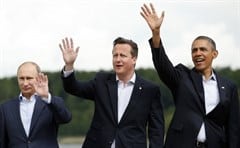
As negotiations toward a “final” nuclear deal between the P5+1 and Iran continue, it is important to consider to what extent the world might be witnessing a fundamental change in American foreign policy. We are inclined to think that the Obama administration would not have gone as far down the diplomatic road with Iran as it has in the absence of President Obama’s self-inflicted debacle over his declared intention to attack Syria after chemical weapons were used there in August 2013. This episode drove home—to the Obama administration as well as to most of the rest of the world—that the United States can no longer credibly threaten to use military force in the Middle East for hegemonic purposes.
After the American public so resoundingly rebuffed Obama’s call for U.S. military action, his administration was compelled to conclude that starting down the diplomatic road with Iran was politically less costly than pushing for more sanctions and continuing to insist that the “military option” was still “on the table.” But can the Obama administration really go all the way to a comprehensive realignment of relations with the Islamic Republic of Iran—and, in the process, show that the United States can shift proactively from a counterproductive drive to dominate the Middle East to serious engagement with all important regional powers, and not just slink out of region in defeat?
Making such a shift will require Washington to relinquish the self-damaging delusion that the United States can actually maintain hegemony in the Middle East on an open-ended basis. America’s reaction to the ongoing Ukraine crisis suggests that American elites are having a very difficult time giving up this delusion.
Yesterday, the United States and its European partners pushed to have the United Nations Security Council vote on a resolution condemning today’s referendum on the future status of Crimea; for video of the Security Council’s deliberations, see here. As everyone knew going into the Council’s deliberations, Russia vetoed the resolution (China abstained). But it was still a great occasion for the United States and its partners to offer more pompous bloviation on the issue.
In terms of pompous bloviation—bloviation that is so deeply rooted in its author’s unreflective addiction to the idea of America as benign hegemon that he can’t even recognize the obvious hypocrisy of what he is saying—it is hard to beat this segment from NBC’s Meet the Press, see here, with Secretary of State John Kerry earlier this month, just after the Ukraine crisis had broken out. Blind to the self-damning irony of what he is saying, Kerry proclaims (see 1:46 into the video), “You just don’t invade another country on phony pretexts in order to assert your interests.”
Predictably, NBC’s ever-deferential David Gregory steered clear of the obvious come-back question. Fortunately, Jon Stewart didn’t. Playing the clip of Kerry intoning, “You just don’t invade another country on phony pretexts in order to assert your interests,” Stewart—see here, 5:25 into the video—immediately adds, “Any more.” Shifting into his best John Kerry impersonation, Stewart goes on: “Trust me, that is so 2003. I mean I voted for it even though I was against it at the time. What happened was I ran for president…I should go.” (Of course, even Jon Stewart can’t quite see that, notwithstanding his criticism of the Iraq War, he has himself advocated U.S. intervention—on phony pretexts—in Libya and Syria.)
Similarly hegemonic delusion is reflected in the transatlantic spouting of “ideas” on how to hurt Russia’s economy with sanctions—ideas that, as the Financial Times’ James McKintosh notes, range “from the impractical to the pointless.” Brookings Institution president Strobe Talbott blithely claimed that Russia’s banking sector “has made quite a lot of progress in plugging into the global system. That means it is vulnerable, and a good lever for applying pressure.”
Western sanctions may well afflict some transitory discomfort on some parts of Russia’s economy. But the reality is that a lot of Western financial institutions, especially in Europe, have themselves become dependent on Russian capital; as this capital is pulled out of these institutions in anticipation of sanctions, Western banks will suffer, too. For the United States, Russia has become over the last decade a significant purchaser and holder of U.S. Treasury securities. How does it serve American interests for Washington to incentivize the dumping of Russia’s Treasury holdings and to cut Russia off as a future buyer of U.S. government debt?
And, of course, there is the surfeit of triumphalism about how America can leverage its “shale revolution” to weaken Russia’s strategic position by exporting liquefied natural gas (LNG) to Europe. For those who seem to think that the United States could be exporting gas to Eastern Europe and parts of the former Soviet Union within months (if not weeks), if only Washington would issue more export licenses, we would note that it takes literally years and costs at least $10 billion to develop an LNG train. More broadly, the idea that the United States will ever produce enough LNG for export at sufficiently low price points to undercut the enormous built-in advantages that an established major gas producer like Russia enjoys in building and retaining its gas export markets in Eurasia seems, to say the least, highly fanciful.
American foreign policy remains far removed from some of the most basic elements of rational (and reality-based) strategy and diplomacy.
Reprinted with permission from Going to Tehran.
